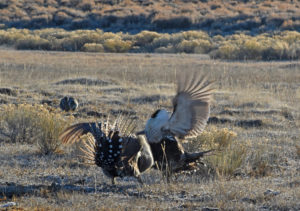Online Messenger #261
(view with pictures, as displayed in email)
Two years to the day that Western Watersheds Project first stopped illegal well construction on the Twin C allotment, WWP has succeeded in blocking the Bureau of Land Management’s second attempt at a bad plan.
The Goat Camp Well project entails using $100,000 of taxpayer dollars to install a new well in the uplands of the Twin C allotment. In 2011, the BLM illegally tried to sneak its decision by interested public, but WWP appealed and halted well construction pending complete environmental review. That first judgment ordering a stay was issued on December 5, 2011.
In the summer of 2012, the BLM recycled its bad infrastructure idea with some new justification; WWP commented and waited for a revised proposal.
Simultaneously, the BLM renewed the grazing permit for the Twin C allotment, making no mention of the concurrent well project or the need to change management. WWP appealed the grazing permit decision as well. The BLM subsequently withdrew the decision and agreed the environmental analysis of grazing was deficient.
When the BLM issued a new plan to build the same well at Goat Camp in 2013, it still somehow managed to avoid talking about the real issues regarding the need for the well: unsupportable levels of livestock grazing on the allotment. Once again, WWP appealed the decision.
On December 5, 2013, the Goat Camp Well was stayed again! Under federal law, the agency is supposed to take a hard look at all the effects of a plan, and the Administrative Law Judge agreed that by segmenting the projects (permit renewal and well drilling) the agency was foreclosing any honest consideration of ending grazing on the allotment.
This is a significant victory for WWP, because the agency implements range developments and issues grazing permits all the time without honestly considering whether the land should be grazed at all, let alone have more infrastructure fragmenting and fracturing the landscape on the public dime.
Posthumous thanks are owed to Joe Feller, who helped establish the case law that set precedent for this preliminary win.






